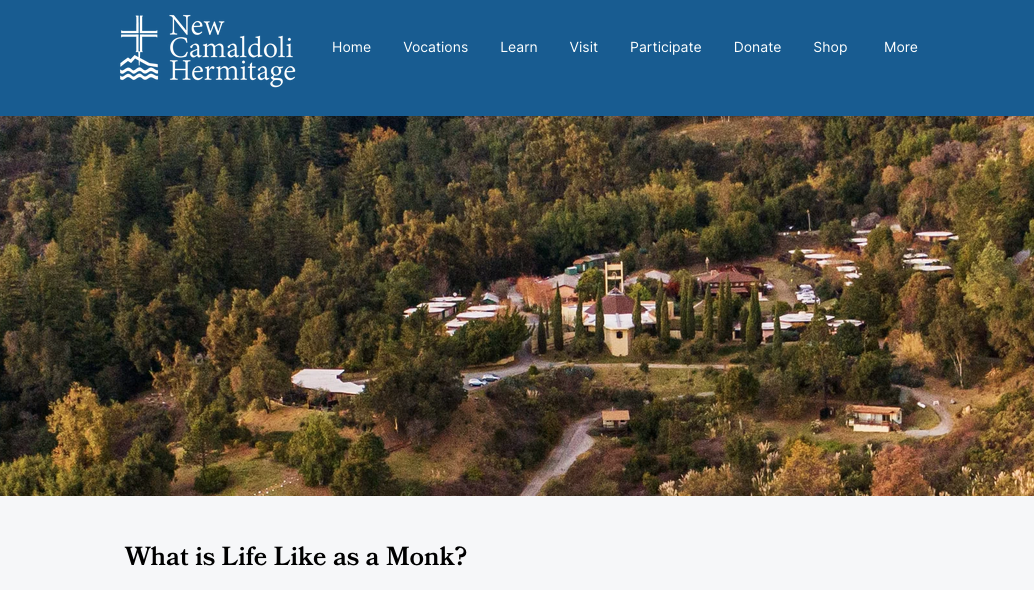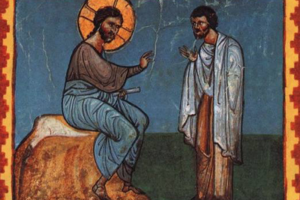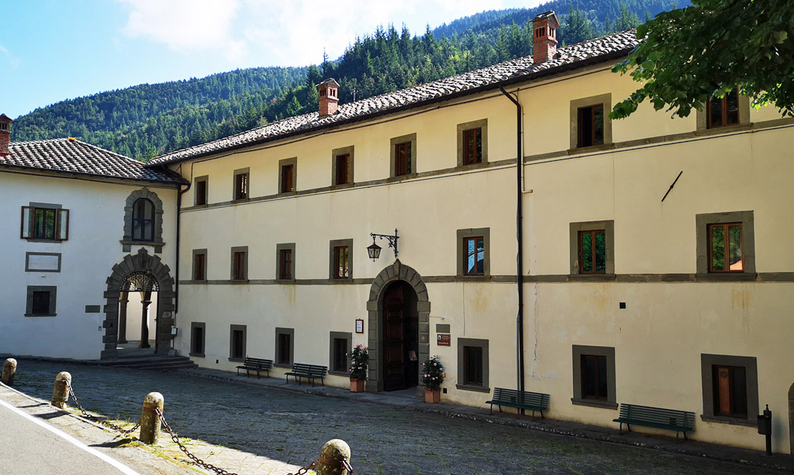We at Catholic Business Journal found these wonder-filled Advent reflections from Father Matteo, the Prior General (in Italy) of the Camaldolese Congregation of the Order of Saint Benedict, and written to the wide, international congregation of Camaldolese monks, nuns, lay oblates, friends and guests, to provide simple yet deep spiritual anchors to help you and I focus on the meanings of Advent — even amid the external, sometimes business year-end demands and often self-imposed chaos of the Season.
See what you think…
Dear brother monks, sister nuns, dear oblates, friends, and guests,
The beginning of the Advent season is a favorable opportunity to give more space to listen to the Word, to commit to a living liturgy that shines with noble simplicity, and to concrete gestures of welcoming the Lord into our lives. In this context, I reach out to you with a sincere wish addressed to everyone and to share with simplicity an itinerary that Scripture leads us to undertake at this time of the liturgical year.
As we approach the winter solstice, when light increasingly gives way to darkness and nature seems to fall asleep, the Church experiences the time of Advent, announcing a story that is not closed in itself but open to an encounter. Time and nature become the language to express faith and show – using an expression by A. Rizzi – its “liturgical vocation.”
The time of Advent is a time that profoundly challenges monastic life: reading the prologue to the Rule of Benedict it seems that all monastic life is a time of “vigilance”, a time of Advent. Benedict states: «Let us get up, therefore, once and for all, following the incitement of Scripture which exclaims: “It is time to wake up from sleep!”» (RB, Prologue). We are used to thinking of the expression of the Rule that “the life of the monk must always have a Lenten character” (RB 49,1). However, we should say that monastic life should also always have the features of Advent.From the biblical texts that the liturgy proposes in this time, we can try to derive a small vocabulary of Advent that guides us in understanding this time, which is so important for Christian life and supports our personal and communal spiritual life. This vocabulary could also provide us with the fundamental traits of our monastic presence.
Vigilance
On the first Sunday of the Advent season of cycle B, the first word of Advent is “vigilance” (Is 63: 16-17.19; 64:1-7; 1Cor 1:3-9; Mk 13:33-37). “Be watchful” is the command of Jesus with which we begin this season of Advent. It is the last word that Jesus leaves to his disciples and to everyone (Mk 13:37) for the time that they will have to live during the hard days of his passion (Mk 14:34.37.38), but also for the entire time of absence of the groom, from his Easter to his return.
The Lord who will return is compared to a master who has gone on a journey whose return remains unknown to his servants who in the meantime must look after his house. No one can predict his return. He can arrive “in the evening or at midnight or at cockcrow or in the morning”! (Mk 13:35). He comes in the evening when Judas, one of his disciples, delivers him for money into the hands of his adversaries, of those who wanted to take his life (Mk 14.17). He comes at midnight, the heart of darkness and night, when Jesus will find himself “judged” (Mk 14:60-62) by the Sanhedrin, before the high priest. He comes at the cockcrow when even the friend whom he trusted (Ps 40:10) denies him three times and does not recognize him in front of the people (Mt 10:33)! He comes in the morning when the high priests, with the elders, the scribes and the whole Sanhedrin deliver him into the hands of Pilate (Mk 15:1) and to a pagan tribunal (see E. BIANCHI , Il Vangelo di Marco, Qiqajon, Magnano (BI) 1984, 249).
Thus this last word of Jesus has become a word capable of interpreting every moment of the present of his disciples of all times, who always “in the evening or at midnight or at cockcrow or in the morning” (Mk 13:35) risk of to betray him, to judge him, to deny him, to condemn him.
“Vigilance” is the word that accompanies every step of the life of the disciples who walk behind their Master in the difficult time of passion and in the difficult time of the absence of the bridegroom, which is also a time of encounter and faithfulness. It is not a matter of standing idle looking at the horizon of history waiting for the Lord’s return: we need to be faithful “gatekeepers” who look after the house that the Lord, upon leaving, entrusted to us. We could say this: keeping watch means “guarding the house.” This task is entrusted to us all: the faithful guardianship of the house the Lord entrusted to us. The doorkeeper in the parable becomes a model for every disciple of the Lord, but we could say that this task is entrusted to every monk and nun: to be faithful doorkeepers of the house of God.
This cry of Jesus, which opens this season of Advent, is not the affirmation of a simple absence but an indication of a hidden presence in the evenings, in the nights, at dawn, in the mornings of our days. A presence that can become a meeting – precisely Advent! – because “now – the Advent liturgy tells us – he comes to meet us in every human being and in every time… so that we welcome him!” (Preface I/A).
Gospel
A second word that the Advent vocabulary offers us is “gospel,” as we hear on the second Sunday of Advent of year B (Is 40:1-5.9-11; Psalm 84; 2Pt 3:8-14; Mk 1:1-8). If the first term – vigilance, to be watchful – was the last word of Jesus, entrusted to his disciples before his passion, the term “gospel” opens the Gospel of Mark (Mk 1:1).
The entire Old Testament is marked by the expectation of this new word from the Lord. The prophets announce the approach of heralds of good news, of evangelizers. Isaiah speaks to an exiled and discouraged people of messengers of beautiful/good news, witnesses that, despite the weakness that humanity experiences within himself and around them (Is 40:7), the word of our God always endures (Is 40:8) and is the solid foundation on which to build the future.
The Gospel of Mark precisely recalls this term from the Hebrew Scriptures to begin its story and to speak of Jesus, in continuity with the expectations of Israel, thus indicating him as the event of God’s salvation: «The beginning of the Gospel of Jesus Christ, the Son of God.” (Mk 1:1). The first disciples of Jesus think back to their experience with that man from Nazareth and call him and his announcement “gospel”, because they discover that precisely in him was fulfilled that definitive word of God capable of healing and freeing deeply every man and woman.
The expression “Gospel of Jesus Christ, the Son of God” does not only indicate the good news which was the announcement of Jesus Christ in words and deeds, but also and above all the good news which was Jesus himself, because it is in him, in his humanity, which God’s definitive intervention takes place in favor of his people and the entire human family.
(reflections continue below)
What have we done with this word so precious, so strong? If the first communities had such a strong experience of the risen Lord that they recognized the “gospel” of God in him, how come we have so diminished the significance of this term as to make it capable of evoking almost only the four booklets that have been handed down to us the life and words of Jesus?
Advent brings this word back to the center of our life and invites us to question ourselves about our way of waiting for the One who comes: the Advent time evangelizes our time, the time of every man and woman, the time of humanity by announcing that there is someone to wait for and that this “someone” is the “gospel” of God for the life of humanity. Advent reminds us that the Christian is not the one who awaits with fear and sadness a terrible and frightening judgment from God at the end of history, but the one who knows that time is the guardian of good news, of a “gospel” of God which makes it ferment from within, which creates newness where everything seems “already said” Advent reminds us that we are, first of all, custodians of this new word pronounced by God in Christ Jesus to free men and women from all the fears that keep them enslaved. Pope Francis also reminds us of this in Evanglii Gaudium: «The joy of the gospel fills the hearts and lives of all who encounter Jesus. Those who accept his offer of salvation are set free from sin, sorrow, inner emptiness and loneliness. With Christ joy is constantly born anew.” (EG 1)
Testimony
The third word we encounter on our Advent journey is “testimony”. The liturgy of the third Sunday entrusts this term to the voice and life of John the Baptist (Is 61:1-2.10-11; 1Thess 5:16-24; Jn 1:6- 8.19-28). John, a man sent by God, had to bear testimony to the light: “He was not the light, but he was sent to bear witness to the light.” (Jn 1:8) In God’s plan, in his original plan, “was life, and the life was the light of all people.” (Jn 1:4) The light of life present in God’s plan has always shined and spreads, even though the darkness does not welcome it, the light shines in the darkness, it is always available, it illuminates (Jn 1:9), and welcomes into life every man and woman who comes into the world (Jn 1:9). God’s plan, which is life in abundance, shines in the light and illuminates every human being, but humanity often does not welcome the light in which life shines and lives in darkness, while they are called to the light.
This light-life, rejected by humanity, takes flesh in Jesus; in him the original plan of God is manifested and incarnated in fullness. He, “the true light, which enlightens everyone, was coming into the world.” (Jn 1:9). To humanity blinded by a life of lies, the Word made flesh reveals the way of life. John comes “to bear witness to the light,” to awaken the yearning for the light in the heart of humanity. His testimony is weak, although his voice rings with courage and strength. It is a testimony that must reawaken the desire for life. This is why John is the man of Advent, because he perennially remains this testimony that cries out in the desert to make the eyes of men and women attentive to the light that inevitably shines.
John begins his “testimony” to the light by speaking negatively: he is not the light. Another is the light of the world, and he came to indicate it as present, to say that the light shines: “among you stands someone you do not know” (Jn 1:26). An Other must be at the center, an Other must be awaited, an Other is true life, which shines like a light. The season of Advent in the figure of John reminds us of the need to be able to notice these voices that say “It is not me” but which are true witnesses of the light, capable of reawakening in us the desire for life and light and which indicate to us the face of that Other on which the plan of God shines in fullness, which from the beginning is life. Advent in John tells us that “the provisional” is the place in which testimony lives over time: it is the place of non-idolatry because it does not hold human’s gaze on itself; it has no pretensions to definitiveness but puts us back on the path in history with a fixed gaze towards fulfillment.
Advent in John calls us to the authentic testimony to be received and given, it makes us discover the joy of knowing that in the small provisional testimonies lies the secret to meeting the one in whom life shines in fullness, to listening to the vocation we carry in our hearts, that vocation to God’s plan which is life. As monastic communities, we should look to the figure of John and his testimony. We too, like the precursor, are called to be a voice crying in the desert to indicate the true light that comes into the world. We too, like John, are called to say “it is not I” to indicate only Christ as the Expected One of history.
The Advent that we go through with our gaze fixed on the future is actually a praise of the provisional (A. Louf): today becomes a place of testimony to the Absolute that the heart of man and woman seeks. Thus, at the school of Advent, our eyes become capable of seeing how, from the simple contemplation of the earth that produces vegetation, from the extreme “temporary” nature of a garden whose splendor lasts a few months, we can see the announcement of salvation of God who manifests himself and shines (Is 61:11).
Grace
A fourth word that we find on the Advent journey saves us from believing that our efforts to prepare a way in the desert, to straighten winding paths, to lower hills and mountains, to fill the valleys, are what constitutes this time: “grace.” This is a term very dear to Luke. He uses it abundantly both in his Gospel and in Acts.
“Grace” indicates the gift of God, which is always like the manna that the Lord gave as food to the people who walked in the desert towards the Land. It dissolves in the hands of those who try to accumulate it, to hold it, and it rots for those who consider it an automatic and obvious guarantee that does not depend every day on a free and loving act of He who is truly the source of life. This term comes to illuminate our Advent journey and our life with its richness. Having arrived at the doors of the celebration of the mystery of the incarnation of the Word and of his manifestation to the world, the liturgy offers us this word, which places us in an attitude of humble and grateful welcome. It is the attitude of someone who knows they have nothing to give but everything to receive freely.
It is Mary’s disposition that we encounter in the story of the annunciation in the Gospel of Luke. But even before that, it is what resonates in the story we find in the Second Book of Samuel, when God promises David a house. King David thinks he is the one who has to build a temple, a sumptuous house for his God. Even the prophet Nathan is admired by the king’s projects, he believes them to be beautiful and great projects, but the word of God, on that same night, reveals that David will not build a house, but God himself will build a house for the king (2Sam 7:11). God thus unmasks every human claim and constantly places before the eyes of men and women a long history in which he has proven faithful in acting in favor of his people.
In the angel’s announcement to Mary, God’s grace is fully manifested. Mary is greeted by the angel as “filled with grace” (28), and immediately afterward, she is told not to fear because she has found favor with God. It is God who is building in the Son a house for his people and for humanity, a place for full communion with him. All of this is accomplished in a way that unequivocally states – a virgin/mother – that all is grace! God is faithful to his promises and a house is built not by human hands (Acts 7:48) but by God himself. Mary is the woman of Advent precisely because she shows us complete availability for grace.
On Christmas night we will read the wonderful reading taken from the letter to Titus which interprets Christmas, the incarnation of the Word, precisely like this, as a manifestation of grace: «the grace of God has appeared, bringing salvation to all people, that teaches us… to live with sobriety, justice and piety in this world, waiting for the blessed hope…» (Tt 2:11-14). The fourth word of Advent illuminates our “vigilance” with a new light (1st Sunday), makes the term “gospel” true and real (2nd Sunday) because everything is then permanently “good news”; it gives meaning to the “testimony” (third Sunday) to be received and carried and prepares us for a humble welcome!
Happy Advent!
Advent invites us to rediscover in our lives and in the life of our communities this little “vocabulary”: vigilance, gospel, testimony, grace. Let us live this path that lies ahead of us, rediscovering these words in our life: they have the strength to transfigure it, rejuvenate it, and shape it.
This is my wish for the Advent that lies ahead of us for each of our communities, for each of us: to be vigilant men and women, guardians of the house of the Lord awaiting his return; to be “evangelical” men and women, capable of being transparency of the joy of the Gospel; being men and women “witnesses” like John, who only point to Jesus as the hope and salvation of the world; to be men and women of grace, poor people who know they have nothing to claim as due, but everything to receive as grace!
Happy Advent!
Fr. Matteo
Prior General





You must be logged in to post a comment.